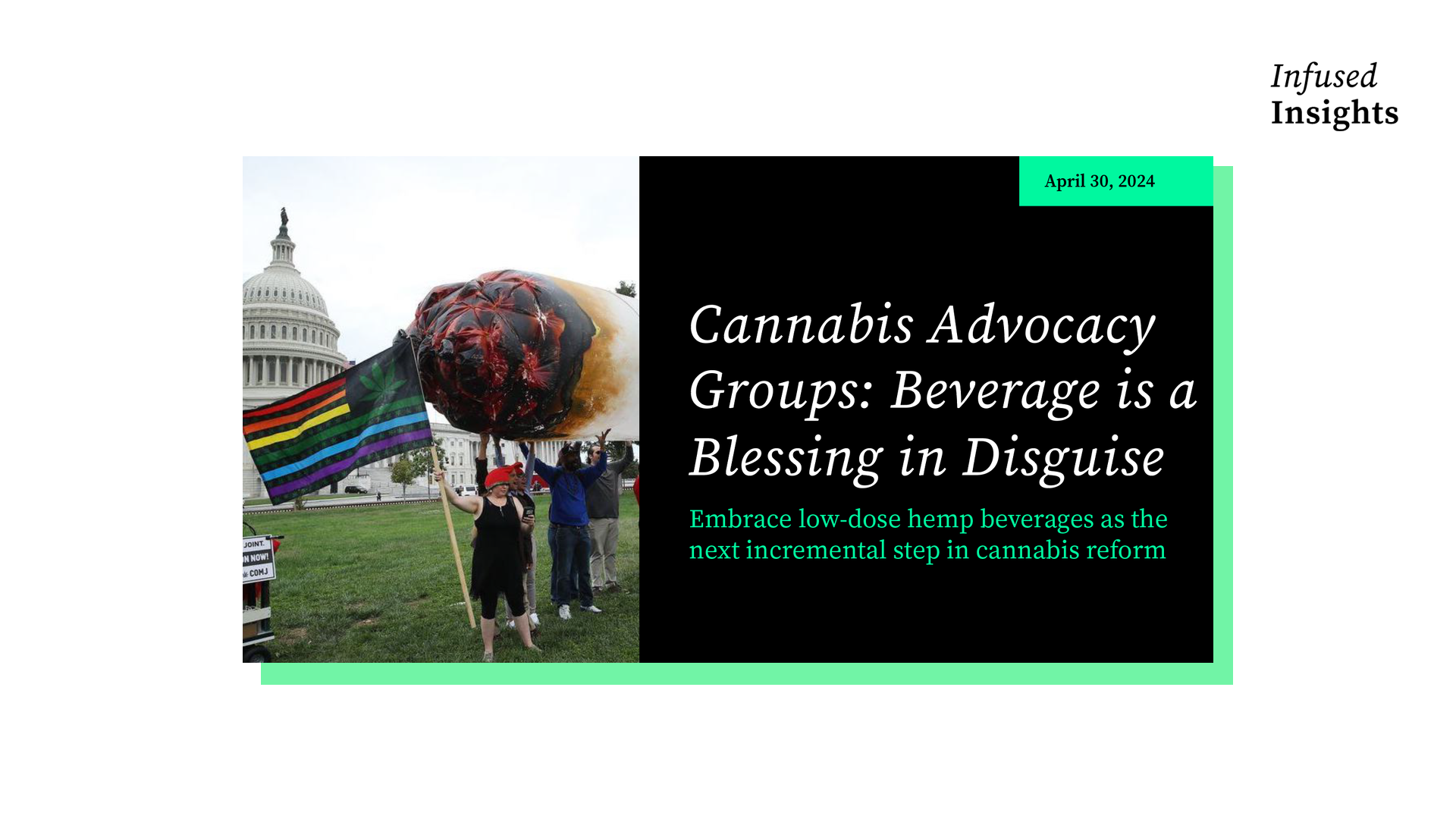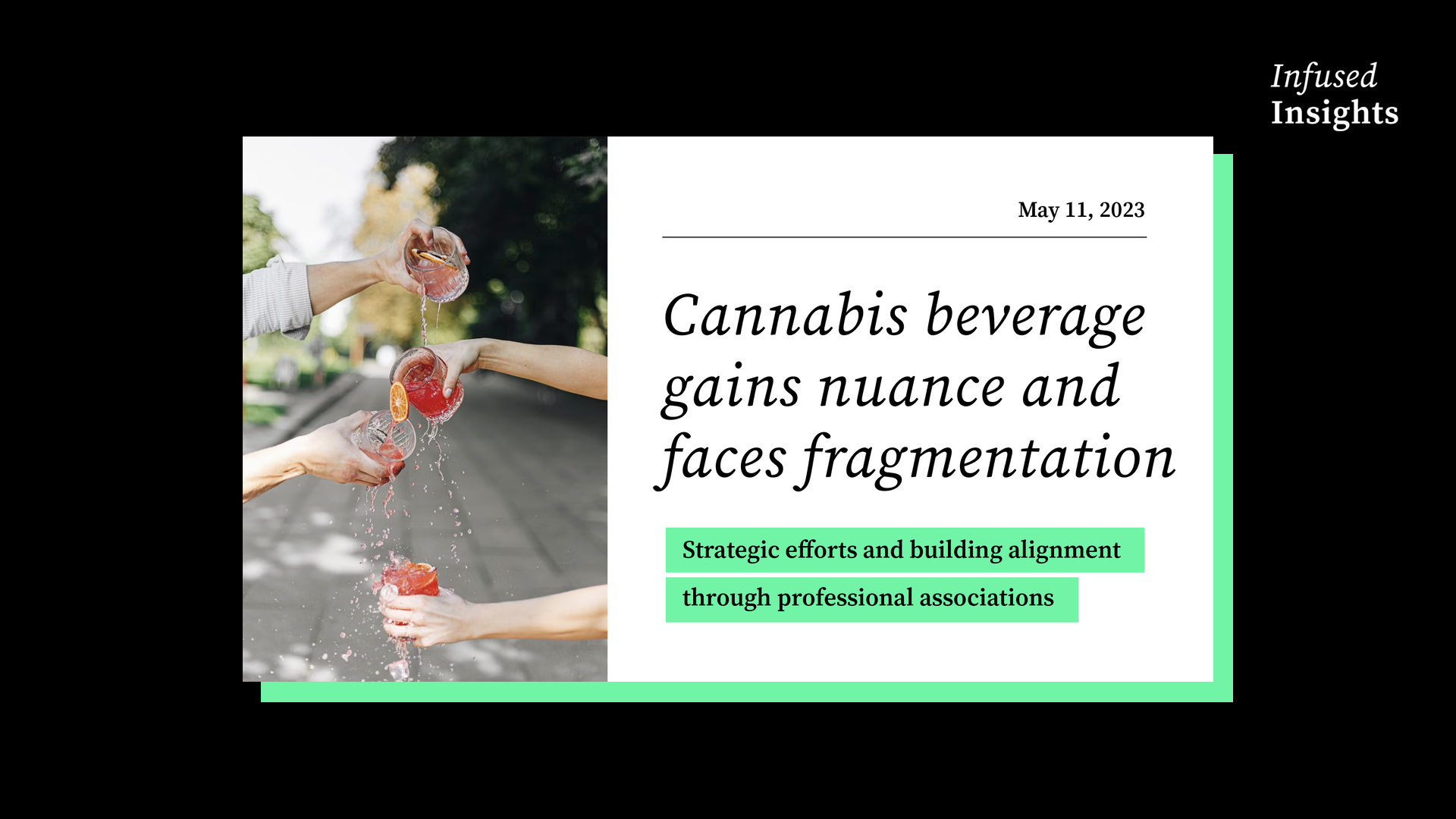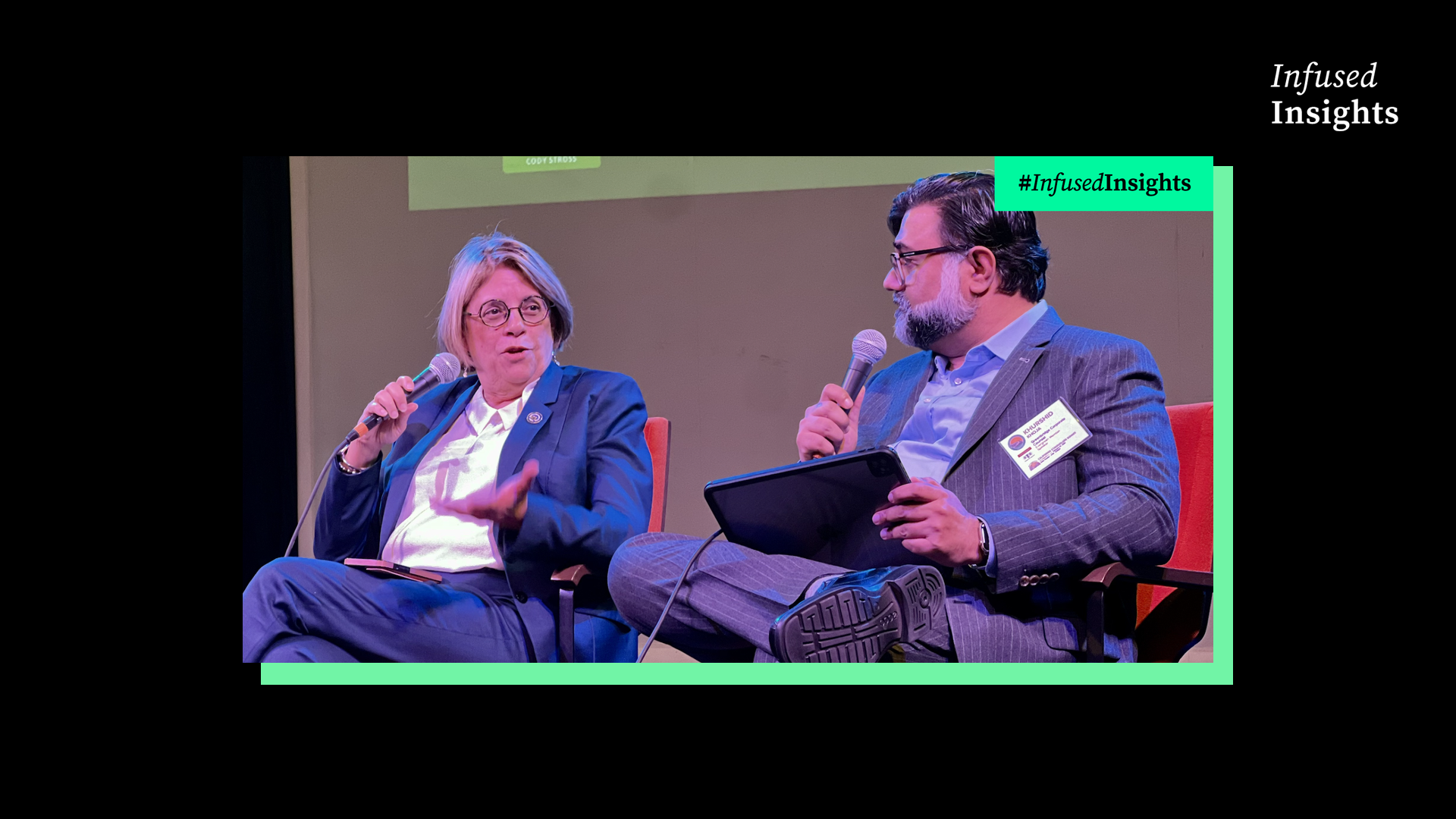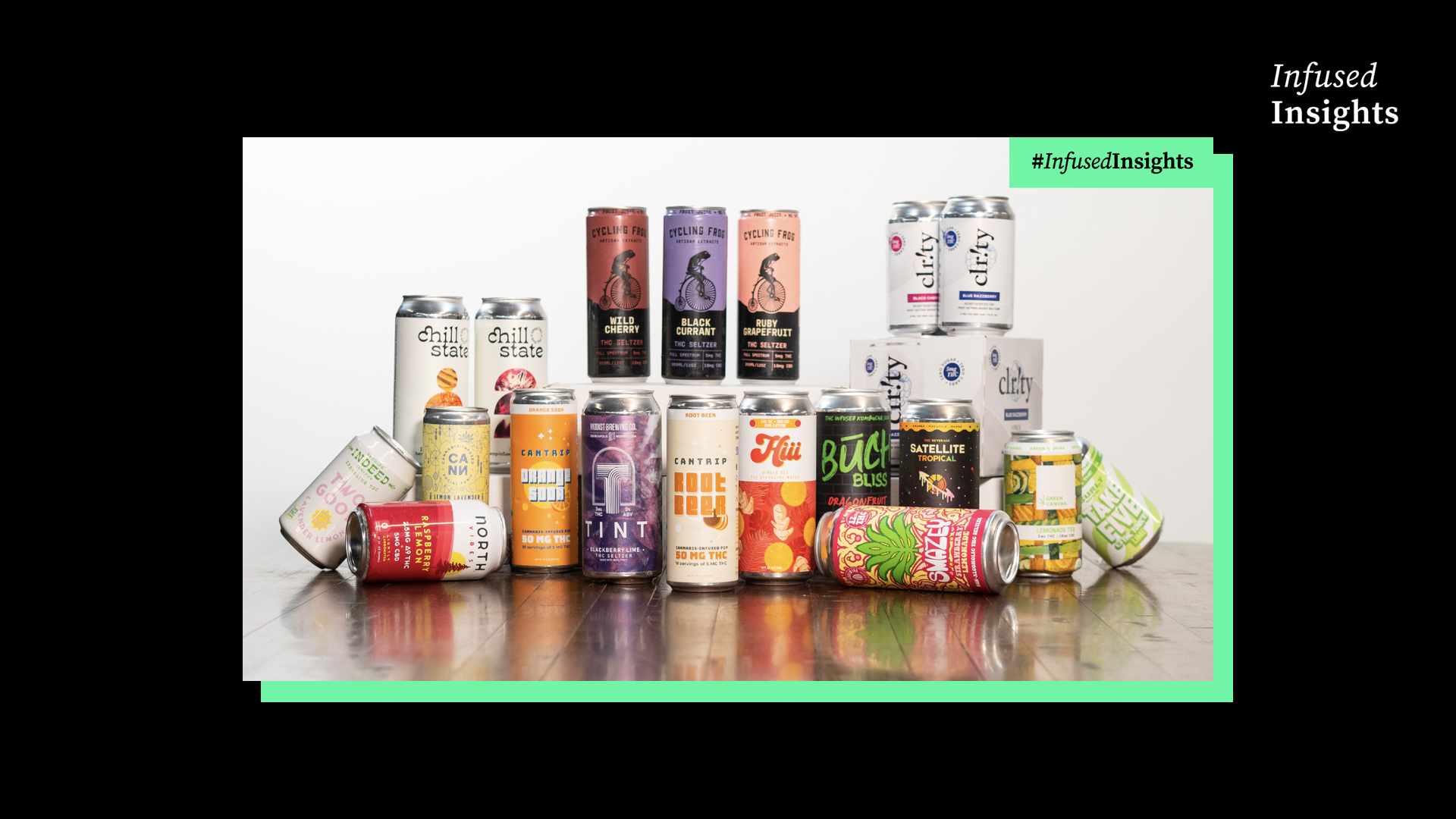Are you participating in a cannabis beverage association?
This post originally appeared on Ben's LinkedIn Newsletter, Infused Insights. You can read and leave comments here.

This post originally appeared on Ben's LinkedIn Newsletter, Infused Insights. You can read and leave comments here.
As members of a community united by a common goal of cannabis reform, we continually explore various avenues to advance our cause as the legal landscape continuously shifts. Sometimes those shifts are unexpected and require us to reassess our legalization strategy.
As a continuation of my series on low-dose THC beverages, I want to address a strategy that may initially seem unconventional, if not controversial, but holds tremendous potential for broader legalization and societal acceptance: the mainstreaming of low-dose THC beverages. I’ve heard the criticisms: the activity is undermining the legalization effort, products aren’t safe, or the open framework doesn’t support the social equity efforts. I will address these directly below.
The vision of cannabis legalization that many voters supported is far from the reality we observe today. Consumers and operators alike navigate a labyrinth of restrictive zoning, convoluted regulations, and stigmatizing marketing restrictions. By championing low-dose beverages — a familiar and approachable product format — we can significantly shift public perceptions, helping to normalize cannabis use in social settings akin to alcohol consumption. This approach not only bridges the gap between hemp and high-THC cannabis but also sets the stage for more comprehensive reforms.
We have the opportunity to leverage a product form factor that has consistently struggled in the state-licensed cannabis channel, but shows incredible promise in the mainstream adult beverage channels, to create greater access to the plant, normalize THC, and generate tax revenues to share the burden on the cannabis industry.

THC beverages being served alongside their alcoholic counterparts is normalization at its best. Credit: MinnPost photo by Corey Anderson
Further explanation of this is expanded upon in my previous articles, starting with Low Dose Beverages Will Pave the Way for Legalization (April 5, 2024).
The Cannabis Beverage Association and the Hemp Beverage Alliance, which collectively boast memberships largely representative of the low-dose THC beverage category from both sides of the plant, are at the forefront of advocating for rigorous quality and safety standards within our industry and encourage operator-driven regulation among all members and require alignment around certain codes of conduct.
Most low-dose beverages currently on the market, by nature of the manufacturing requirements of the products, are already produced in state-of-the-art, cGMP-certified facilities, ensuring product integrity and consumer safety. Many co-packers, such as Surly Brewing Co. in Minnesota or Beak & Skiff Apple Orchards in New York, have diversified or migrated from other mainstream markets, like craft beer and other functional beverages.

Based in Minnesota, Surly brewing continues to expand its hemp operations. Source: Surly Brewing
I've witnessed much debate recently about the quality and safety of the ingredients being used in the space. Converted cannabinoids do exist in hemp, as they do in cannabis, and I could (and likely will) write an entire article from a scientific perspective as to why this isn't inherently problematic, but will also state that there are also significant sources of naturally extracted hemp THC available in the industry. You can read more about how this is achieved in an article published by my business partner, Dr. Harold Han.
Further, all hemp THC ingredients currently manufactured by Vertosa are Farm Bill compliant, naturally extracted from the plant, and come with complete chain of custody documentation with full panel testing and quality attestations at multiple points in the supply chain. This is more than what is typically required in the state licensed cannabis channel. And if there is ever doubt, there are new developments in testing, driven by Josh Swider and the team at Infinite Chemical Analysis Labs in response to converted cannabinoids in the licensed cannabis channels in Michigan, where you can utilize a $100 test to determine the derivation of hemp THC.
Further, the beverage category is welcoming of formal regulations, testing requirements, and fair taxation.
The establishment of equity license programs across various states was a commendable step towards rectifying the injustices inflicted by the War on Drugs. However, these programs have often fallen short of their ambitious promises. Intended to offer paths to generational wealth, they have instead left many participants burdened by a system that sets them up for failure rather than flourishing. As detailed in analyses by prominent publications, such as Politico and The Guardian, these programs have not sufficiently leveled the playing field, and in some instances, have exacerbated the disparities they aimed to eliminate.
I recently had a discussion with Todd K. Harris, Co-Founder of the hemp beverage brand Plift, and he explained how introducing low-dose beverages in mainstream markets introduces an important social justice consideration and could offer a more accessible entry point for justice impacted operators, potentially reducing the barriers to success that currently exist within the complex cannabis industry. More on this topic in his article with MPRnews.

Plift co-founders, Todd Harris and Glenn McElfresh (left) in Minneapolis. Source: Tim Evans for MPR News
It is time to acknowledge the intrinsic link between hemp, especially that of the intoxicating nature, and cannabis and to cease the artificial separation that has long undermined our collective efforts. By embracing low-dose THC beverages as a legitimate, valuable addition to the cannabis family, we can utilize this moment to propel our legalization and normalization efforts.
As advocates, our mission is to support the progression of cannabis reform in all its forms. By backing the inclusion of low-dose THC beverages in mainstream channels, we not only open up new pathways for consumer acceptance but also reinforce our commitment to justice, quality, and safety within the cannabis industry. Please consider supporting this promising avenue, ensuring that our actions today lead to a more inclusive, equitable, and accepted cannabis tomorrow.
If you're still not convinced or have outstanding questions, please be sure to engage me in the comments.
< Hemp Operators: Support Responsible and Incremental Beverage Progress
Hemp and Cannabis Beverage Trade Groups: Charting a Unified & Effective Path Forward >

This post originally appeared on Ben's LinkedIn Newsletter, Infused Insights. You can read and leave comments here.

This post originally appeared on Ben's LinkedIn Newsletter, Infused Insights. You can read and leave comments here.

This post originally appeared on Ben's LinkedIn Newsletter, Infused Insights. You can read and leave comments here.